Entrepreneurship Report: Entrepreneurial Ventures and Brexit Analysis
VerifiedAdded on 2020/10/22
|16
|4788
|206
Report
AI Summary
This report delves into the multifaceted world of entrepreneurship, examining different types of entrepreneurial ventures, including micro, small, and medium-sized enterprises, and their relation to the typology of entrepreneurship, such as lifestyle and growth firms. It explores the similarities and differences between these ventures, analyzing aspects like capital investment, revenue, and management techniques. The report also investigates the impact of micro and small businesses on the UK economy, highlighting their contribution to employment, GDP, and exports, as well as their role in the local, national, and international markets. Furthermore, it discusses the benefits of small businesses and start-up enterprises in the context of Brexit, considering the changes and challenges faced by businesses after the UK's separation from the European Union. The report provides a comprehensive analysis of entrepreneurial ventures, emphasizing their characteristics, economic impact, and the challenges and opportunities they encounter in the current business environment.

ENTREPRENEURSHIP
Paraphrase This Document
Need a fresh take? Get an instant paraphrase of this document with our AI Paraphraser
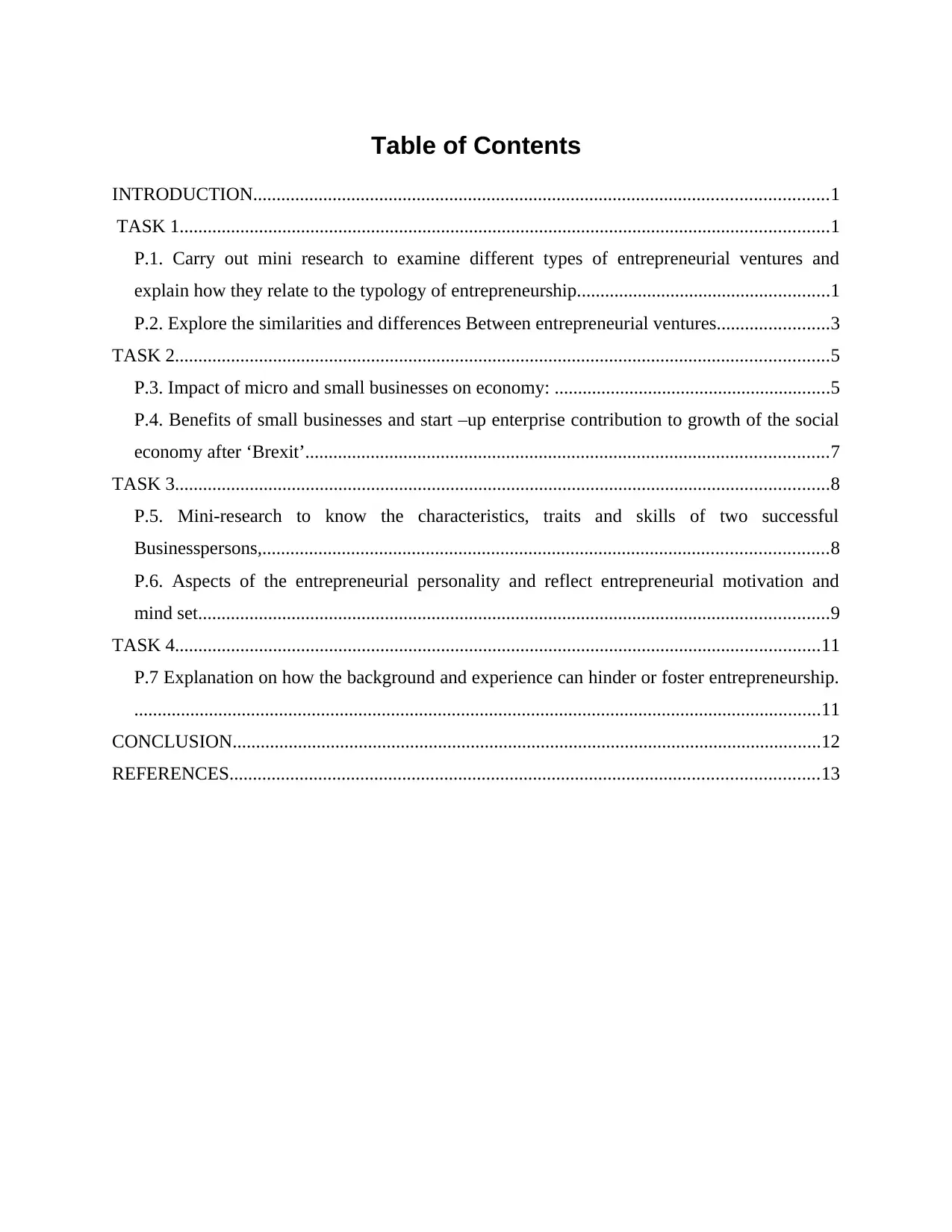
Table of Contents
INTRODUCTION...........................................................................................................................1
TASK 1...........................................................................................................................................1
P.1. Carry out mini research to examine different types of entrepreneurial ventures and
explain how they relate to the typology of entrepreneurship......................................................1
P.2. Explore the similarities and differences Between entrepreneurial ventures........................3
TASK 2............................................................................................................................................5
P.3. Impact of micro and small businesses on economy: ...........................................................5
P.4. Benefits of small businesses and start –up enterprise contribution to growth of the social
economy after ‘Brexit’................................................................................................................7
TASK 3............................................................................................................................................8
P.5. Mini-research to know the characteristics, traits and skills of two successful
Businesspersons,.........................................................................................................................8
P.6. Aspects of the entrepreneurial personality and reflect entrepreneurial motivation and
mind set.......................................................................................................................................9
TASK 4..........................................................................................................................................11
P.7 Explanation on how the background and experience can hinder or foster entrepreneurship.
...................................................................................................................................................11
CONCLUSION..............................................................................................................................12
REFERENCES..............................................................................................................................13
INTRODUCTION...........................................................................................................................1
TASK 1...........................................................................................................................................1
P.1. Carry out mini research to examine different types of entrepreneurial ventures and
explain how they relate to the typology of entrepreneurship......................................................1
P.2. Explore the similarities and differences Between entrepreneurial ventures........................3
TASK 2............................................................................................................................................5
P.3. Impact of micro and small businesses on economy: ...........................................................5
P.4. Benefits of small businesses and start –up enterprise contribution to growth of the social
economy after ‘Brexit’................................................................................................................7
TASK 3............................................................................................................................................8
P.5. Mini-research to know the characteristics, traits and skills of two successful
Businesspersons,.........................................................................................................................8
P.6. Aspects of the entrepreneurial personality and reflect entrepreneurial motivation and
mind set.......................................................................................................................................9
TASK 4..........................................................................................................................................11
P.7 Explanation on how the background and experience can hinder or foster entrepreneurship.
...................................................................................................................................................11
CONCLUSION..............................................................................................................................12
REFERENCES..............................................................................................................................13
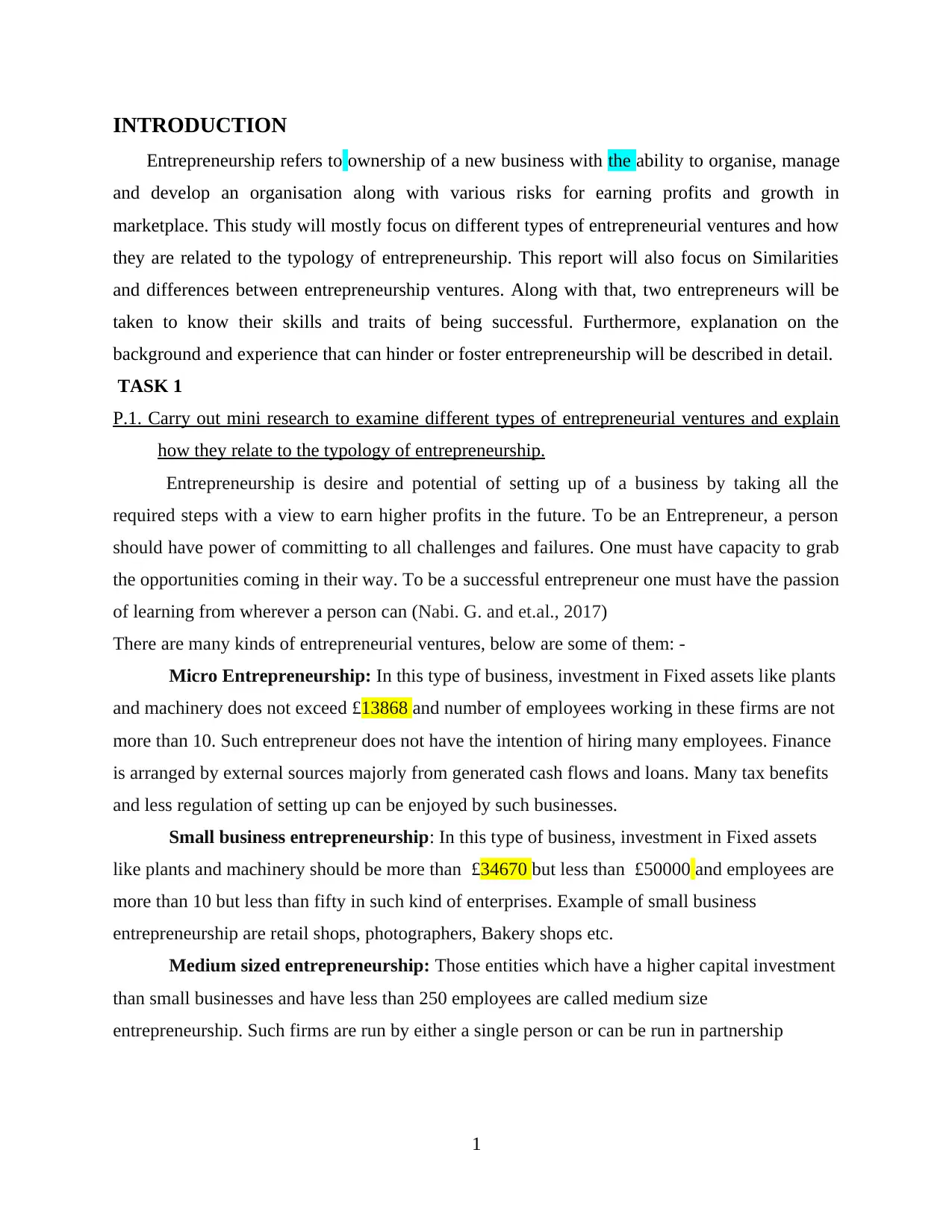
INTRODUCTION
Entrepreneurship refers to ownership of a new business with the ability to organise, manage
and develop an organisation along with various risks for earning profits and growth in
marketplace. This study will mostly focus on different types of entrepreneurial ventures and how
they are related to the typology of entrepreneurship. This report will also focus on Similarities
and differences between entrepreneurship ventures. Along with that, two entrepreneurs will be
taken to know their skills and traits of being successful. Furthermore, explanation on the
background and experience that can hinder or foster entrepreneurship will be described in detail.
TASK 1
P.1. Carry out mini research to examine different types of entrepreneurial ventures and explain
how they relate to the typology of entrepreneurship.
Entrepreneurship is desire and potential of setting up of a business by taking all the
required steps with a view to earn higher profits in the future. To be an Entrepreneur, a person
should have power of committing to all challenges and failures. One must have capacity to grab
the opportunities coming in their way. To be a successful entrepreneur one must have the passion
of learning from wherever a person can (Nabi. G. and et.al., 2017)
There are many kinds of entrepreneurial ventures, below are some of them: -
Micro Entrepreneurship: In this type of business, investment in Fixed assets like plants
and machinery does not exceed £13868 and number of employees working in these firms are not
more than 10. Such entrepreneur does not have the intention of hiring many employees. Finance
is arranged by external sources majorly from generated cash flows and loans. Many tax benefits
and less regulation of setting up can be enjoyed by such businesses.
Small business entrepreneurship: In this type of business, investment in Fixed assets
like plants and machinery should be more than £34670 but less than £50000 and employees are
more than 10 but less than fifty in such kind of enterprises. Example of small business
entrepreneurship are retail shops, photographers, Bakery shops etc.
Medium sized entrepreneurship: Those entities which have a higher capital investment
than small businesses and have less than 250 employees are called medium size
entrepreneurship. Such firms are run by either a single person or can be run in partnership
1
Entrepreneurship refers to ownership of a new business with the ability to organise, manage
and develop an organisation along with various risks for earning profits and growth in
marketplace. This study will mostly focus on different types of entrepreneurial ventures and how
they are related to the typology of entrepreneurship. This report will also focus on Similarities
and differences between entrepreneurship ventures. Along with that, two entrepreneurs will be
taken to know their skills and traits of being successful. Furthermore, explanation on the
background and experience that can hinder or foster entrepreneurship will be described in detail.
TASK 1
P.1. Carry out mini research to examine different types of entrepreneurial ventures and explain
how they relate to the typology of entrepreneurship.
Entrepreneurship is desire and potential of setting up of a business by taking all the
required steps with a view to earn higher profits in the future. To be an Entrepreneur, a person
should have power of committing to all challenges and failures. One must have capacity to grab
the opportunities coming in their way. To be a successful entrepreneur one must have the passion
of learning from wherever a person can (Nabi. G. and et.al., 2017)
There are many kinds of entrepreneurial ventures, below are some of them: -
Micro Entrepreneurship: In this type of business, investment in Fixed assets like plants
and machinery does not exceed £13868 and number of employees working in these firms are not
more than 10. Such entrepreneur does not have the intention of hiring many employees. Finance
is arranged by external sources majorly from generated cash flows and loans. Many tax benefits
and less regulation of setting up can be enjoyed by such businesses.
Small business entrepreneurship: In this type of business, investment in Fixed assets
like plants and machinery should be more than £34670 but less than £50000 and employees are
more than 10 but less than fifty in such kind of enterprises. Example of small business
entrepreneurship are retail shops, photographers, Bakery shops etc.
Medium sized entrepreneurship: Those entities which have a higher capital investment
than small businesses and have less than 250 employees are called medium size
entrepreneurship. Such firms are run by either a single person or can be run in partnership
1
⊘ This is a preview!⊘
Do you want full access?
Subscribe today to unlock all pages.

Trusted by 1+ million students worldwide
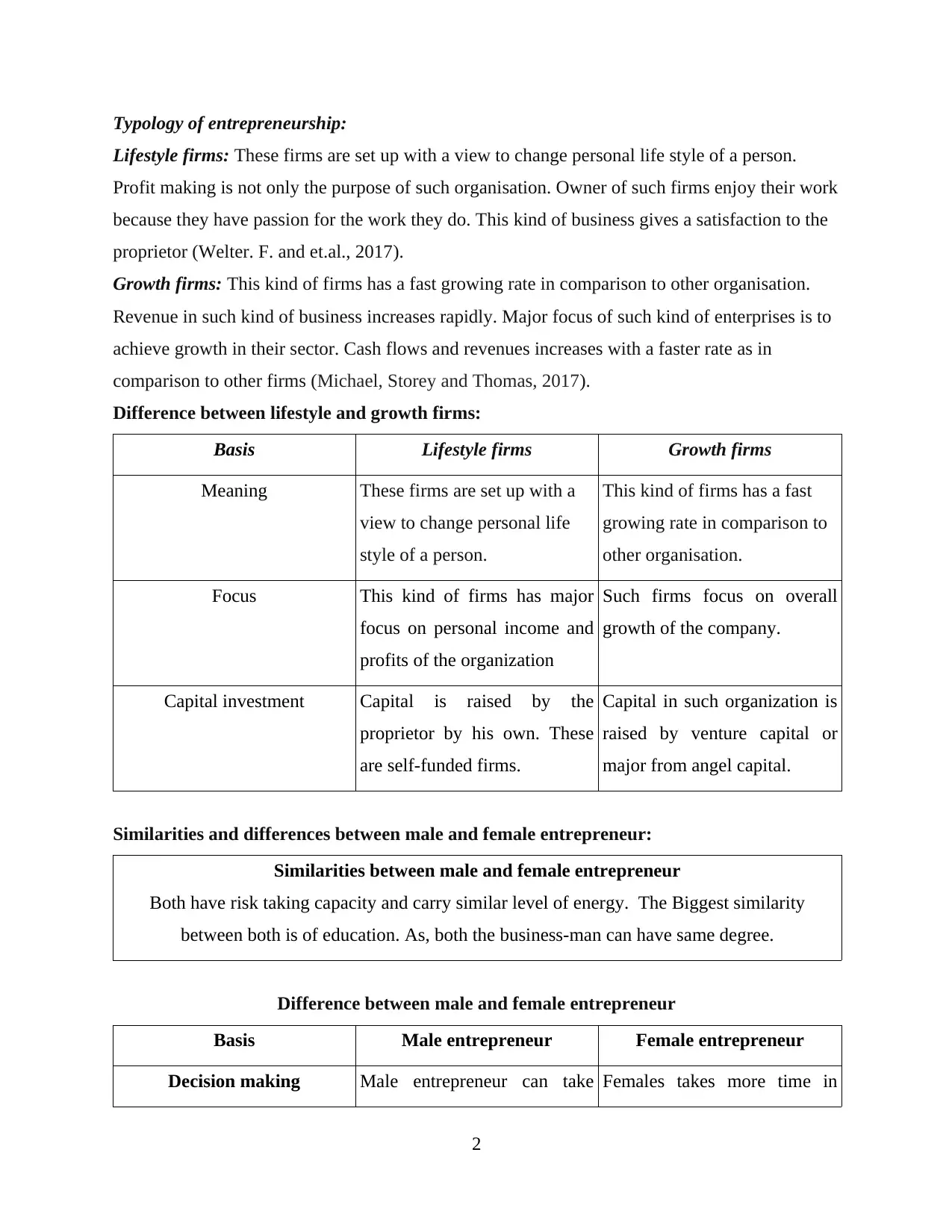
Typology of entrepreneurship:
Lifestyle firms: These firms are set up with a view to change personal life style of a person.
Profit making is not only the purpose of such organisation. Owner of such firms enjoy their work
because they have passion for the work they do. This kind of business gives a satisfaction to the
proprietor (Welter. F. and et.al., 2017).
Growth firms: This kind of firms has a fast growing rate in comparison to other organisation.
Revenue in such kind of business increases rapidly. Major focus of such kind of enterprises is to
achieve growth in their sector. Cash flows and revenues increases with a faster rate as in
comparison to other firms (Michael, Storey and Thomas, 2017).
Difference between lifestyle and growth firms:
Basis Lifestyle firms Growth firms
Meaning These firms are set up with a
view to change personal life
style of a person.
This kind of firms has a fast
growing rate in comparison to
other organisation.
Focus This kind of firms has major
focus on personal income and
profits of the organization
Such firms focus on overall
growth of the company.
Capital investment Capital is raised by the
proprietor by his own. These
are self-funded firms.
Capital in such organization is
raised by venture capital or
major from angel capital.
Similarities and differences between male and female entrepreneur:
Similarities between male and female entrepreneur
Both have risk taking capacity and carry similar level of energy. The Biggest similarity
between both is of education. As, both the business-man can have same degree.
Difference between male and female entrepreneur
Basis Male entrepreneur Female entrepreneur
Decision making Male entrepreneur can take Females takes more time in
2
Lifestyle firms: These firms are set up with a view to change personal life style of a person.
Profit making is not only the purpose of such organisation. Owner of such firms enjoy their work
because they have passion for the work they do. This kind of business gives a satisfaction to the
proprietor (Welter. F. and et.al., 2017).
Growth firms: This kind of firms has a fast growing rate in comparison to other organisation.
Revenue in such kind of business increases rapidly. Major focus of such kind of enterprises is to
achieve growth in their sector. Cash flows and revenues increases with a faster rate as in
comparison to other firms (Michael, Storey and Thomas, 2017).
Difference between lifestyle and growth firms:
Basis Lifestyle firms Growth firms
Meaning These firms are set up with a
view to change personal life
style of a person.
This kind of firms has a fast
growing rate in comparison to
other organisation.
Focus This kind of firms has major
focus on personal income and
profits of the organization
Such firms focus on overall
growth of the company.
Capital investment Capital is raised by the
proprietor by his own. These
are self-funded firms.
Capital in such organization is
raised by venture capital or
major from angel capital.
Similarities and differences between male and female entrepreneur:
Similarities between male and female entrepreneur
Both have risk taking capacity and carry similar level of energy. The Biggest similarity
between both is of education. As, both the business-man can have same degree.
Difference between male and female entrepreneur
Basis Male entrepreneur Female entrepreneur
Decision making Male entrepreneur can take Females takes more time in
2
Paraphrase This Document
Need a fresh take? Get an instant paraphrase of this document with our AI Paraphraser
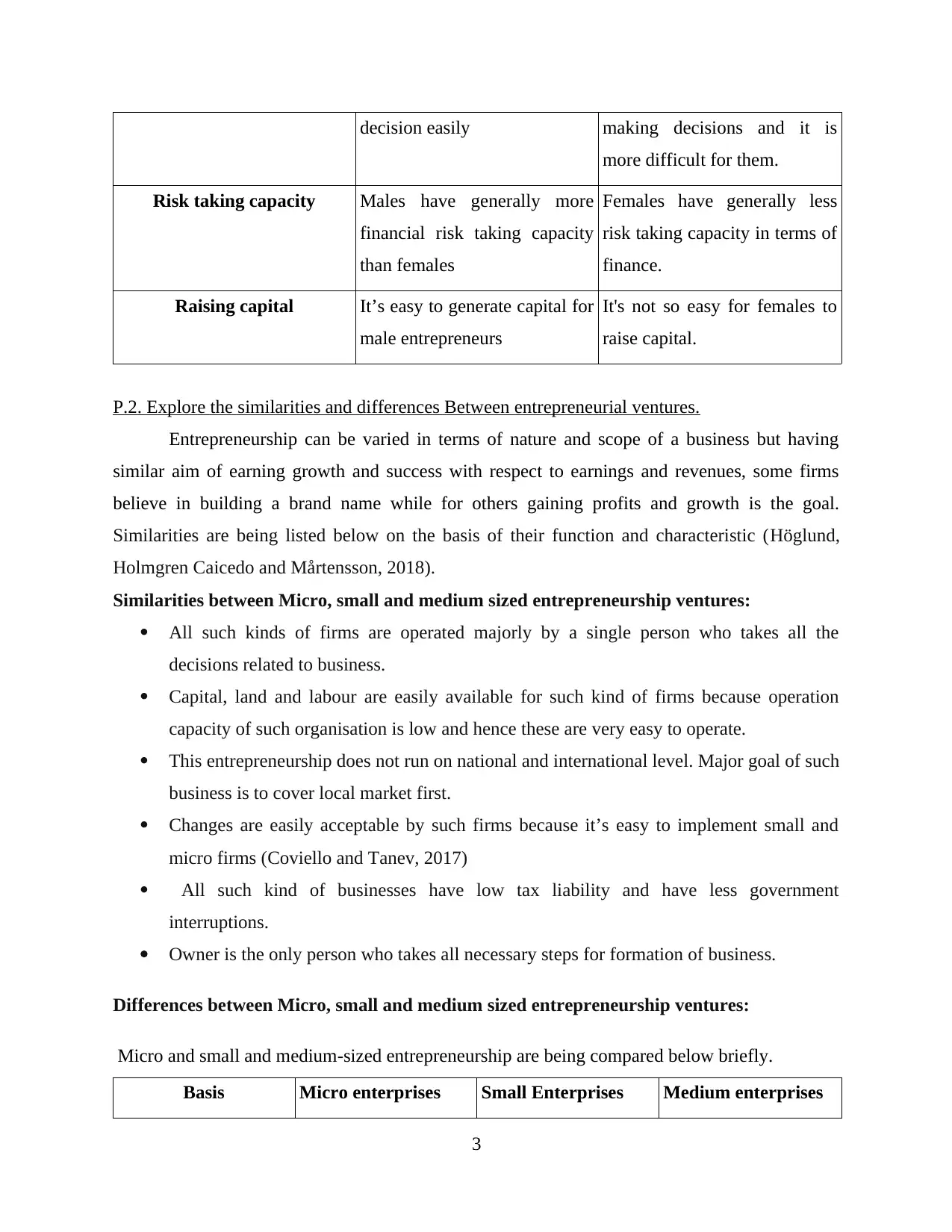
decision easily making decisions and it is
more difficult for them.
Risk taking capacity Males have generally more
financial risk taking capacity
than females
Females have generally less
risk taking capacity in terms of
finance.
Raising capital It’s easy to generate capital for
male entrepreneurs
It's not so easy for females to
raise capital.
P.2. Explore the similarities and differences Between entrepreneurial ventures.
Entrepreneurship can be varied in terms of nature and scope of a business but having
similar aim of earning growth and success with respect to earnings and revenues, some firms
believe in building a brand name while for others gaining profits and growth is the goal.
Similarities are being listed below on the basis of their function and characteristic (Höglund,
Holmgren Caicedo and Mårtensson, 2018).
Similarities between Micro, small and medium sized entrepreneurship ventures:
All such kinds of firms are operated majorly by a single person who takes all the
decisions related to business.
Capital, land and labour are easily available for such kind of firms because operation
capacity of such organisation is low and hence these are very easy to operate.
This entrepreneurship does not run on national and international level. Major goal of such
business is to cover local market first.
Changes are easily acceptable by such firms because it’s easy to implement small and
micro firms (Coviello and Tanev, 2017)
All such kind of businesses have low tax liability and have less government
interruptions.
Owner is the only person who takes all necessary steps for formation of business.
Differences between Micro, small and medium sized entrepreneurship ventures:
Micro and small and medium-sized entrepreneurship are being compared below briefly.
Basis Micro enterprises Small Enterprises Medium enterprises
3
more difficult for them.
Risk taking capacity Males have generally more
financial risk taking capacity
than females
Females have generally less
risk taking capacity in terms of
finance.
Raising capital It’s easy to generate capital for
male entrepreneurs
It's not so easy for females to
raise capital.
P.2. Explore the similarities and differences Between entrepreneurial ventures.
Entrepreneurship can be varied in terms of nature and scope of a business but having
similar aim of earning growth and success with respect to earnings and revenues, some firms
believe in building a brand name while for others gaining profits and growth is the goal.
Similarities are being listed below on the basis of their function and characteristic (Höglund,
Holmgren Caicedo and Mårtensson, 2018).
Similarities between Micro, small and medium sized entrepreneurship ventures:
All such kinds of firms are operated majorly by a single person who takes all the
decisions related to business.
Capital, land and labour are easily available for such kind of firms because operation
capacity of such organisation is low and hence these are very easy to operate.
This entrepreneurship does not run on national and international level. Major goal of such
business is to cover local market first.
Changes are easily acceptable by such firms because it’s easy to implement small and
micro firms (Coviello and Tanev, 2017)
All such kind of businesses have low tax liability and have less government
interruptions.
Owner is the only person who takes all necessary steps for formation of business.
Differences between Micro, small and medium sized entrepreneurship ventures:
Micro and small and medium-sized entrepreneurship are being compared below briefly.
Basis Micro enterprises Small Enterprises Medium enterprises
3
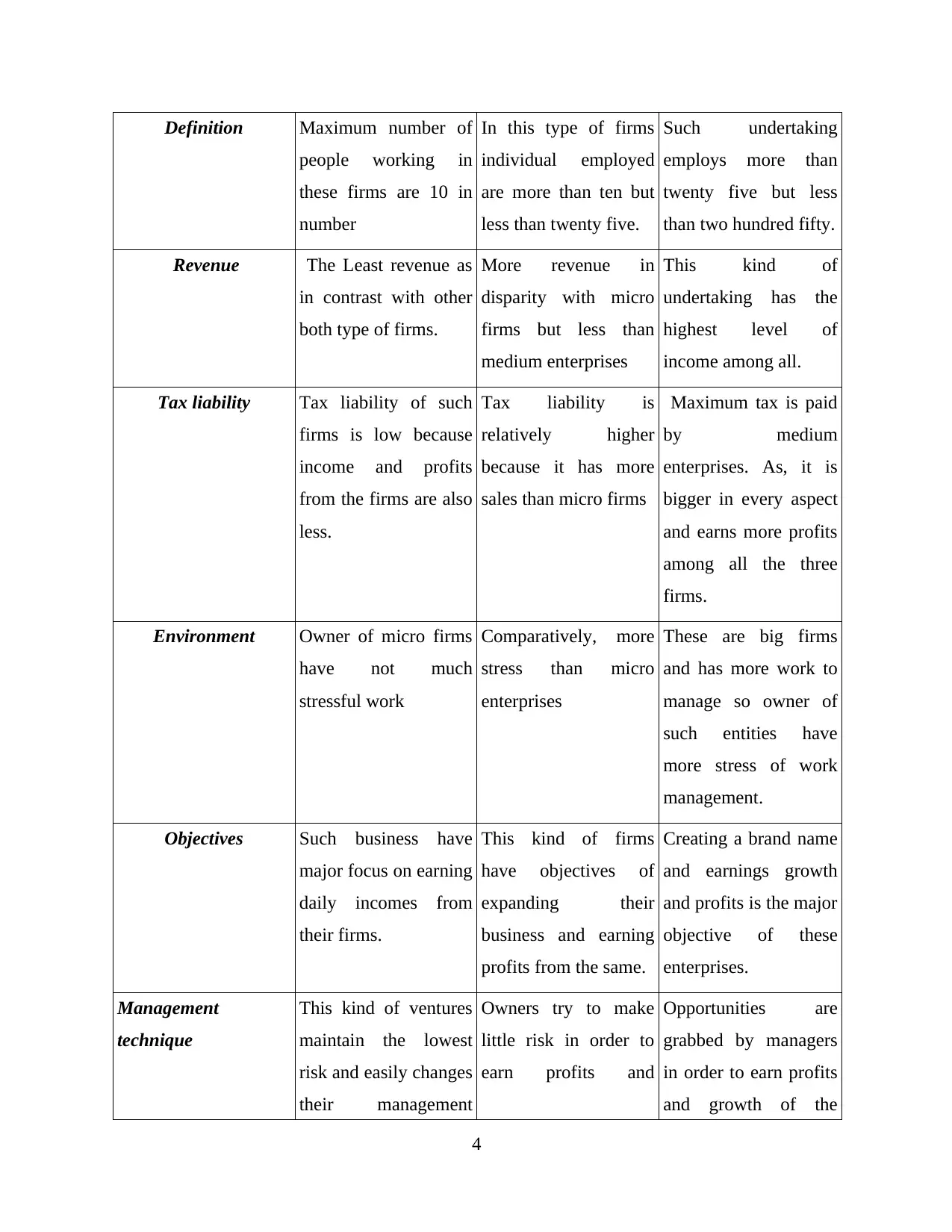
Definition Maximum number of
people working in
these firms are 10 in
number
In this type of firms
individual employed
are more than ten but
less than twenty five.
Such undertaking
employs more than
twenty five but less
than two hundred fifty.
Revenue The Least revenue as
in contrast with other
both type of firms.
More revenue in
disparity with micro
firms but less than
medium enterprises
This kind of
undertaking has the
highest level of
income among all.
Tax liability Tax liability of such
firms is low because
income and profits
from the firms are also
less.
Tax liability is
relatively higher
because it has more
sales than micro firms
Maximum tax is paid
by medium
enterprises. As, it is
bigger in every aspect
and earns more profits
among all the three
firms.
Environment Owner of micro firms
have not much
stressful work
Comparatively, more
stress than micro
enterprises
These are big firms
and has more work to
manage so owner of
such entities have
more stress of work
management.
Objectives Such business have
major focus on earning
daily incomes from
their firms.
This kind of firms
have objectives of
expanding their
business and earning
profits from the same.
Creating a brand name
and earnings growth
and profits is the major
objective of these
enterprises.
Management
technique
This kind of ventures
maintain the lowest
risk and easily changes
their management
Owners try to make
little risk in order to
earn profits and
Opportunities are
grabbed by managers
in order to earn profits
and growth of the
4
people working in
these firms are 10 in
number
In this type of firms
individual employed
are more than ten but
less than twenty five.
Such undertaking
employs more than
twenty five but less
than two hundred fifty.
Revenue The Least revenue as
in contrast with other
both type of firms.
More revenue in
disparity with micro
firms but less than
medium enterprises
This kind of
undertaking has the
highest level of
income among all.
Tax liability Tax liability of such
firms is low because
income and profits
from the firms are also
less.
Tax liability is
relatively higher
because it has more
sales than micro firms
Maximum tax is paid
by medium
enterprises. As, it is
bigger in every aspect
and earns more profits
among all the three
firms.
Environment Owner of micro firms
have not much
stressful work
Comparatively, more
stress than micro
enterprises
These are big firms
and has more work to
manage so owner of
such entities have
more stress of work
management.
Objectives Such business have
major focus on earning
daily incomes from
their firms.
This kind of firms
have objectives of
expanding their
business and earning
profits from the same.
Creating a brand name
and earnings growth
and profits is the major
objective of these
enterprises.
Management
technique
This kind of ventures
maintain the lowest
risk and easily changes
their management
Owners try to make
little risk in order to
earn profits and
Opportunities are
grabbed by managers
in order to earn profits
and growth of the
4
⊘ This is a preview!⊘
Do you want full access?
Subscribe today to unlock all pages.

Trusted by 1+ million students worldwide
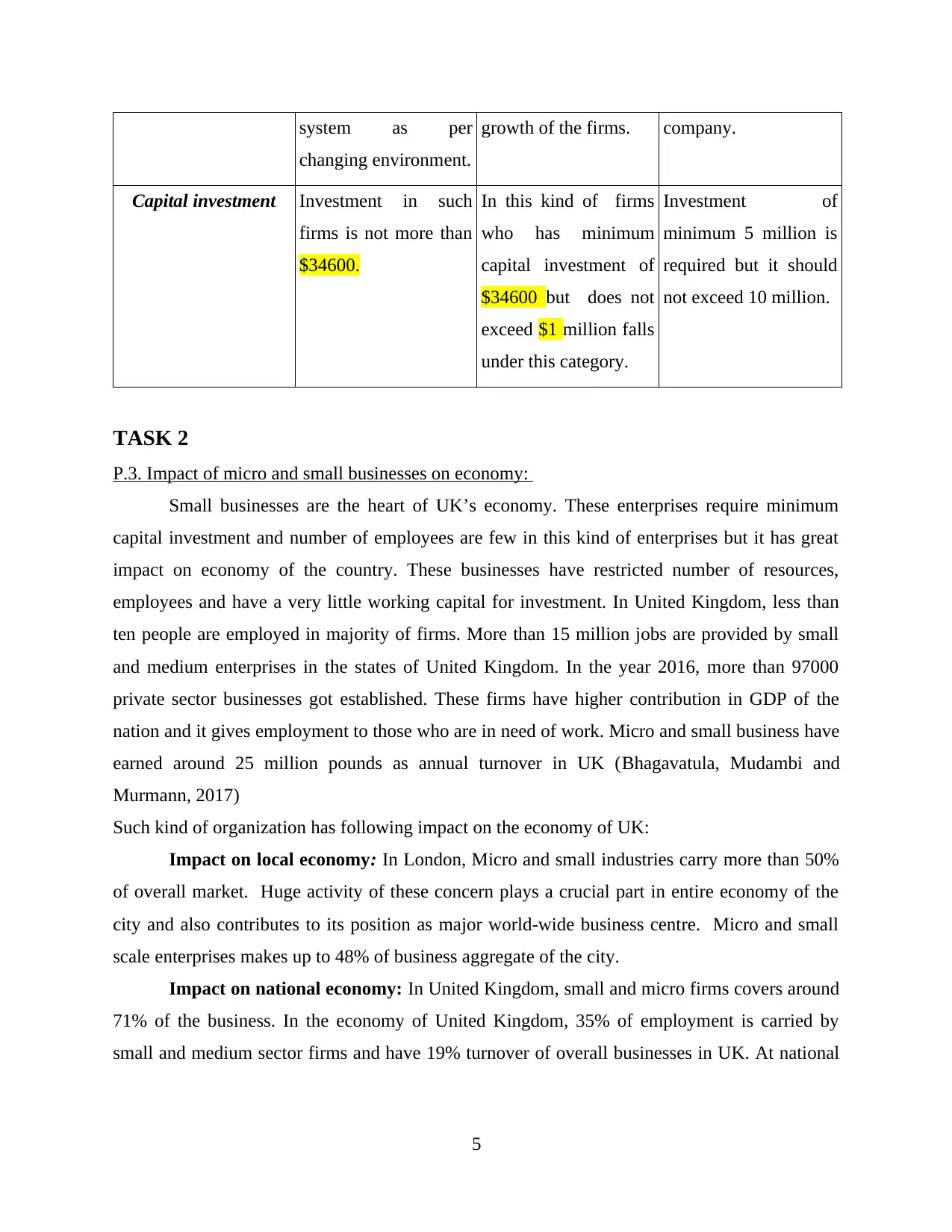
system as per
changing environment.
growth of the firms. company.
Capital investment Investment in such
firms is not more than
$34600.
In this kind of firms
who has minimum
capital investment of
$34600 but does not
exceed $1 million falls
under this category.
Investment of
minimum 5 million is
required but it should
not exceed 10 million.
TASK 2
P.3. Impact of micro and small businesses on economy:
Small businesses are the heart of UK’s economy. These enterprises require minimum
capital investment and number of employees are few in this kind of enterprises but it has great
impact on economy of the country. These businesses have restricted number of resources,
employees and have a very little working capital for investment. In United Kingdom, less than
ten people are employed in majority of firms. More than 15 million jobs are provided by small
and medium enterprises in the states of United Kingdom. In the year 2016, more than 97000
private sector businesses got established. These firms have higher contribution in GDP of the
nation and it gives employment to those who are in need of work. Micro and small business have
earned around 25 million pounds as annual turnover in UK (Bhagavatula, Mudambi and
Murmann, 2017)
Such kind of organization has following impact on the economy of UK:
Impact on local economy: In London, Micro and small industries carry more than 50%
of overall market. Huge activity of these concern plays a crucial part in entire economy of the
city and also contributes to its position as major world-wide business centre. Micro and small
scale enterprises makes up to 48% of business aggregate of the city.
Impact on national economy: In United Kingdom, small and micro firms covers around
71% of the business. In the economy of United Kingdom, 35% of employment is carried by
small and medium sector firms and have 19% turnover of overall businesses in UK. At national
5
changing environment.
growth of the firms. company.
Capital investment Investment in such
firms is not more than
$34600.
In this kind of firms
who has minimum
capital investment of
$34600 but does not
exceed $1 million falls
under this category.
Investment of
minimum 5 million is
required but it should
not exceed 10 million.
TASK 2
P.3. Impact of micro and small businesses on economy:
Small businesses are the heart of UK’s economy. These enterprises require minimum
capital investment and number of employees are few in this kind of enterprises but it has great
impact on economy of the country. These businesses have restricted number of resources,
employees and have a very little working capital for investment. In United Kingdom, less than
ten people are employed in majority of firms. More than 15 million jobs are provided by small
and medium enterprises in the states of United Kingdom. In the year 2016, more than 97000
private sector businesses got established. These firms have higher contribution in GDP of the
nation and it gives employment to those who are in need of work. Micro and small business have
earned around 25 million pounds as annual turnover in UK (Bhagavatula, Mudambi and
Murmann, 2017)
Such kind of organization has following impact on the economy of UK:
Impact on local economy: In London, Micro and small industries carry more than 50%
of overall market. Huge activity of these concern plays a crucial part in entire economy of the
city and also contributes to its position as major world-wide business centre. Micro and small
scale enterprises makes up to 48% of business aggregate of the city.
Impact on national economy: In United Kingdom, small and micro firms covers around
71% of the business. In the economy of United Kingdom, 35% of employment is carried by
small and medium sector firms and have 19% turnover of overall businesses in UK. At national
5
Paraphrase This Document
Need a fresh take? Get an instant paraphrase of this document with our AI Paraphraser
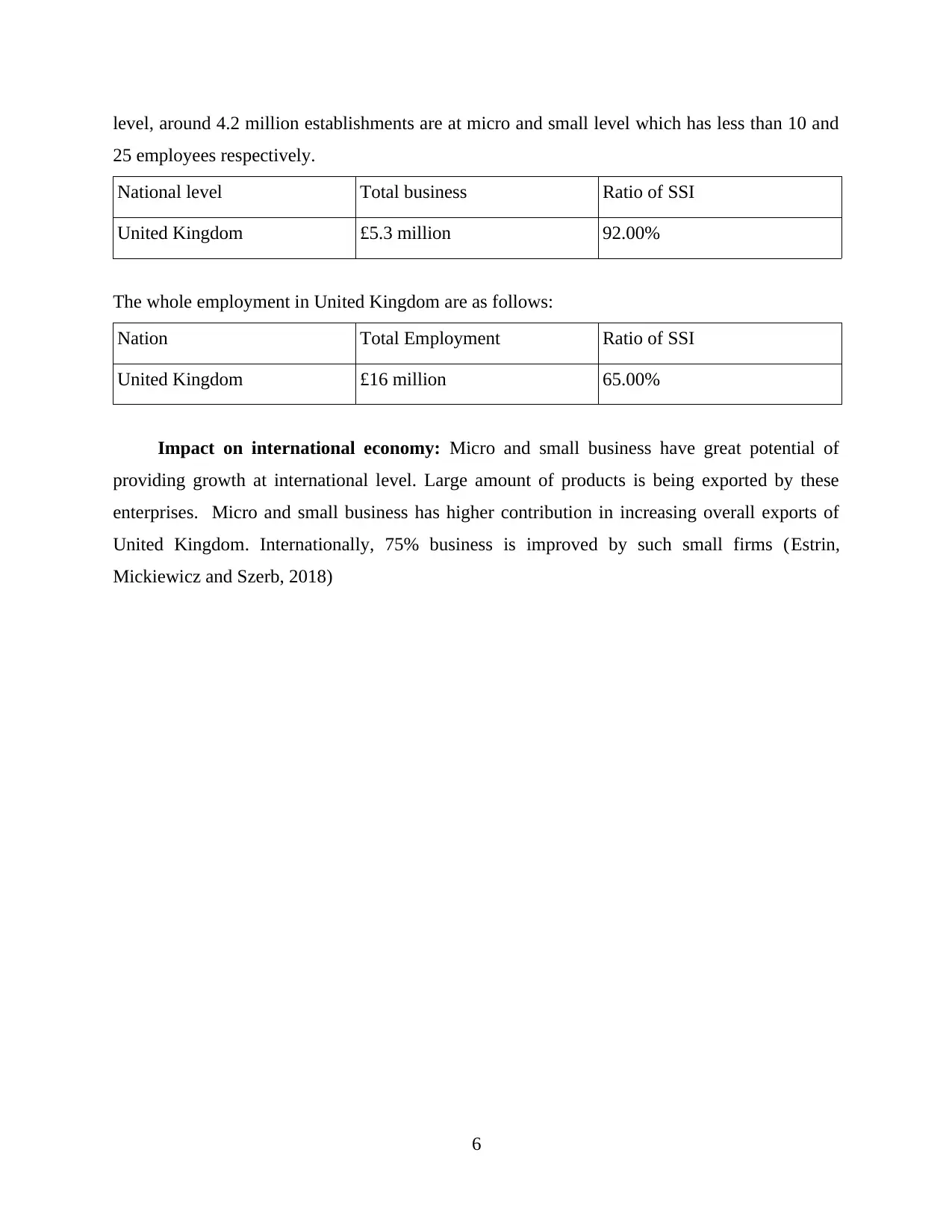
level, around 4.2 million establishments are at micro and small level which has less than 10 and
25 employees respectively.
National level Total business Ratio of SSI
United Kingdom £5.3 million 92.00%
The whole employment in United Kingdom are as follows:
Nation Total Employment Ratio of SSI
United Kingdom £16 million 65.00%
Impact on international economy: Micro and small business have great potential of
providing growth at international level. Large amount of products is being exported by these
enterprises. Micro and small business has higher contribution in increasing overall exports of
United Kingdom. Internationally, 75% business is improved by such small firms (Estrin,
Mickiewicz and Szerb, 2018)
6
25 employees respectively.
National level Total business Ratio of SSI
United Kingdom £5.3 million 92.00%
The whole employment in United Kingdom are as follows:
Nation Total Employment Ratio of SSI
United Kingdom £16 million 65.00%
Impact on international economy: Micro and small business have great potential of
providing growth at international level. Large amount of products is being exported by these
enterprises. Micro and small business has higher contribution in increasing overall exports of
United Kingdom. Internationally, 75% business is improved by such small firms (Estrin,
Mickiewicz and Szerb, 2018)
6
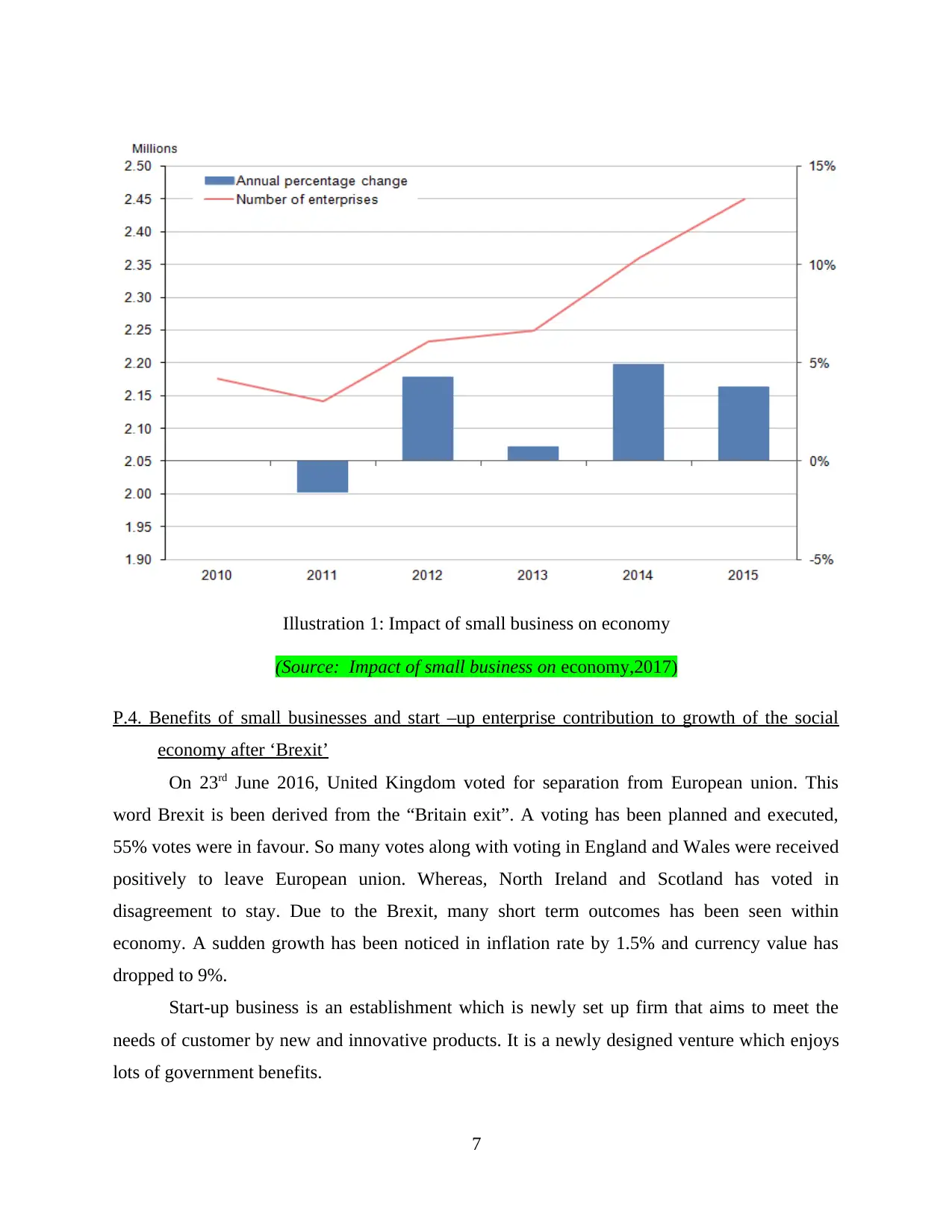
(Source: Impact of small business on economy,2017)
P.4. Benefits of small businesses and start –up enterprise contribution to growth of the social
economy after ‘Brexit’
On 23rd June 2016, United Kingdom voted for separation from European union. This
word Brexit is been derived from the “Britain exit”. A voting has been planned and executed,
55% votes were in favour. So many votes along with voting in England and Wales were received
positively to leave European union. Whereas, North Ireland and Scotland has voted in
disagreement to stay. Due to the Brexit, many short term outcomes has been seen within
economy. A sudden growth has been noticed in inflation rate by 1.5% and currency value has
dropped to 9%.
Start-up business is an establishment which is newly set up firm that aims to meet the
needs of customer by new and innovative products. It is a newly designed venture which enjoys
lots of government benefits.
7
Illustration 1: Impact of small business on economy
P.4. Benefits of small businesses and start –up enterprise contribution to growth of the social
economy after ‘Brexit’
On 23rd June 2016, United Kingdom voted for separation from European union. This
word Brexit is been derived from the “Britain exit”. A voting has been planned and executed,
55% votes were in favour. So many votes along with voting in England and Wales were received
positively to leave European union. Whereas, North Ireland and Scotland has voted in
disagreement to stay. Due to the Brexit, many short term outcomes has been seen within
economy. A sudden growth has been noticed in inflation rate by 1.5% and currency value has
dropped to 9%.
Start-up business is an establishment which is newly set up firm that aims to meet the
needs of customer by new and innovative products. It is a newly designed venture which enjoys
lots of government benefits.
7
Illustration 1: Impact of small business on economy
⊘ This is a preview!⊘
Do you want full access?
Subscribe today to unlock all pages.

Trusted by 1+ million students worldwide
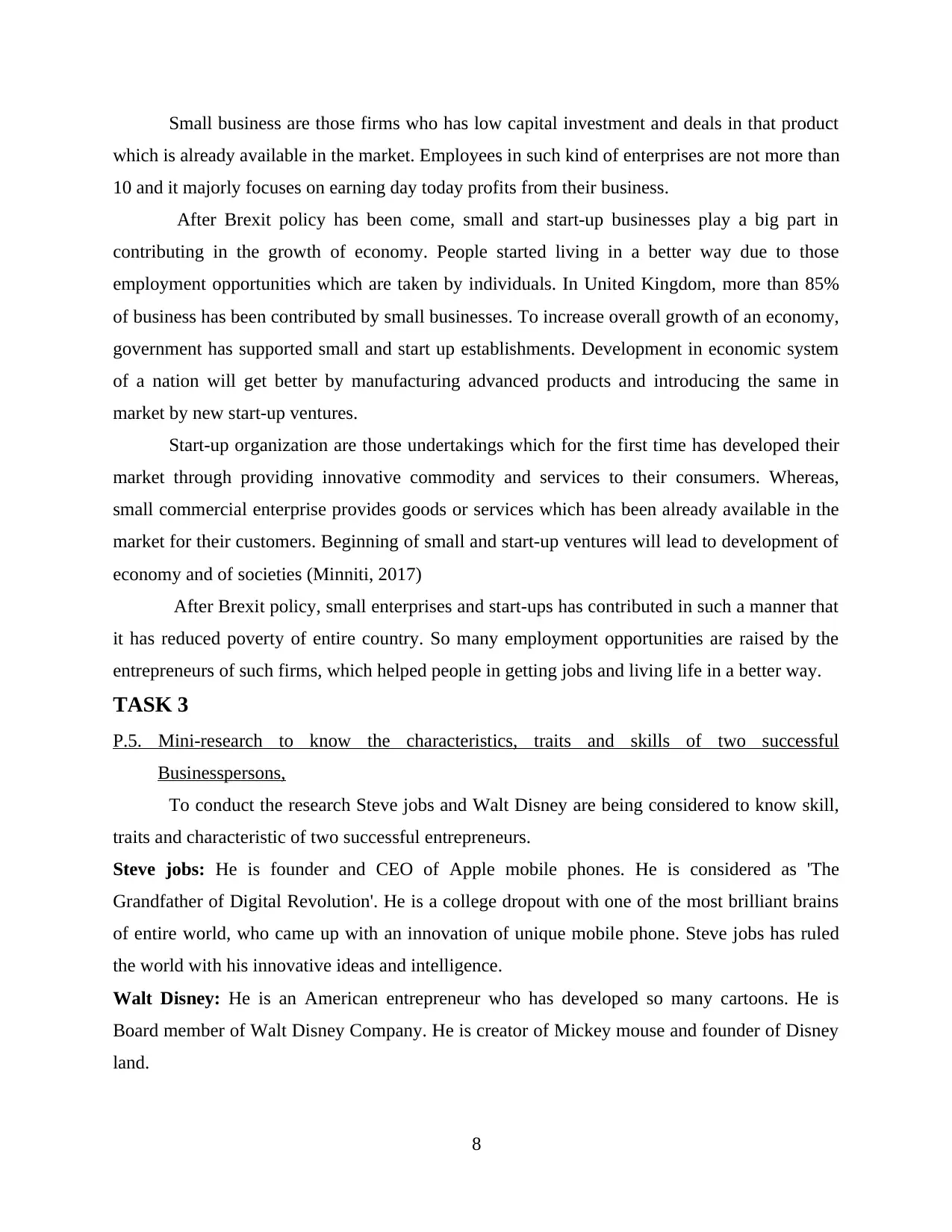
Small business are those firms who has low capital investment and deals in that product
which is already available in the market. Employees in such kind of enterprises are not more than
10 and it majorly focuses on earning day today profits from their business.
After Brexit policy has been come, small and start-up businesses play a big part in
contributing in the growth of economy. People started living in a better way due to those
employment opportunities which are taken by individuals. In United Kingdom, more than 85%
of business has been contributed by small businesses. To increase overall growth of an economy,
government has supported small and start up establishments. Development in economic system
of a nation will get better by manufacturing advanced products and introducing the same in
market by new start-up ventures.
Start-up organization are those undertakings which for the first time has developed their
market through providing innovative commodity and services to their consumers. Whereas,
small commercial enterprise provides goods or services which has been already available in the
market for their customers. Beginning of small and start-up ventures will lead to development of
economy and of societies (Minniti, 2017)
After Brexit policy, small enterprises and start-ups has contributed in such a manner that
it has reduced poverty of entire country. So many employment opportunities are raised by the
entrepreneurs of such firms, which helped people in getting jobs and living life in a better way.
TASK 3
P.5. Mini-research to know the characteristics, traits and skills of two successful
Businesspersons,
To conduct the research Steve jobs and Walt Disney are being considered to know skill,
traits and characteristic of two successful entrepreneurs.
Steve jobs: He is founder and CEO of Apple mobile phones. He is considered as 'The
Grandfather of Digital Revolution'. He is a college dropout with one of the most brilliant brains
of entire world, who came up with an innovation of unique mobile phone. Steve jobs has ruled
the world with his innovative ideas and intelligence.
Walt Disney: He is an American entrepreneur who has developed so many cartoons. He is
Board member of Walt Disney Company. He is creator of Mickey mouse and founder of Disney
land.
8
which is already available in the market. Employees in such kind of enterprises are not more than
10 and it majorly focuses on earning day today profits from their business.
After Brexit policy has been come, small and start-up businesses play a big part in
contributing in the growth of economy. People started living in a better way due to those
employment opportunities which are taken by individuals. In United Kingdom, more than 85%
of business has been contributed by small businesses. To increase overall growth of an economy,
government has supported small and start up establishments. Development in economic system
of a nation will get better by manufacturing advanced products and introducing the same in
market by new start-up ventures.
Start-up organization are those undertakings which for the first time has developed their
market through providing innovative commodity and services to their consumers. Whereas,
small commercial enterprise provides goods or services which has been already available in the
market for their customers. Beginning of small and start-up ventures will lead to development of
economy and of societies (Minniti, 2017)
After Brexit policy, small enterprises and start-ups has contributed in such a manner that
it has reduced poverty of entire country. So many employment opportunities are raised by the
entrepreneurs of such firms, which helped people in getting jobs and living life in a better way.
TASK 3
P.5. Mini-research to know the characteristics, traits and skills of two successful
Businesspersons,
To conduct the research Steve jobs and Walt Disney are being considered to know skill,
traits and characteristic of two successful entrepreneurs.
Steve jobs: He is founder and CEO of Apple mobile phones. He is considered as 'The
Grandfather of Digital Revolution'. He is a college dropout with one of the most brilliant brains
of entire world, who came up with an innovation of unique mobile phone. Steve jobs has ruled
the world with his innovative ideas and intelligence.
Walt Disney: He is an American entrepreneur who has developed so many cartoons. He is
Board member of Walt Disney Company. He is creator of Mickey mouse and founder of Disney
land.
8
Paraphrase This Document
Need a fresh take? Get an instant paraphrase of this document with our AI Paraphraser
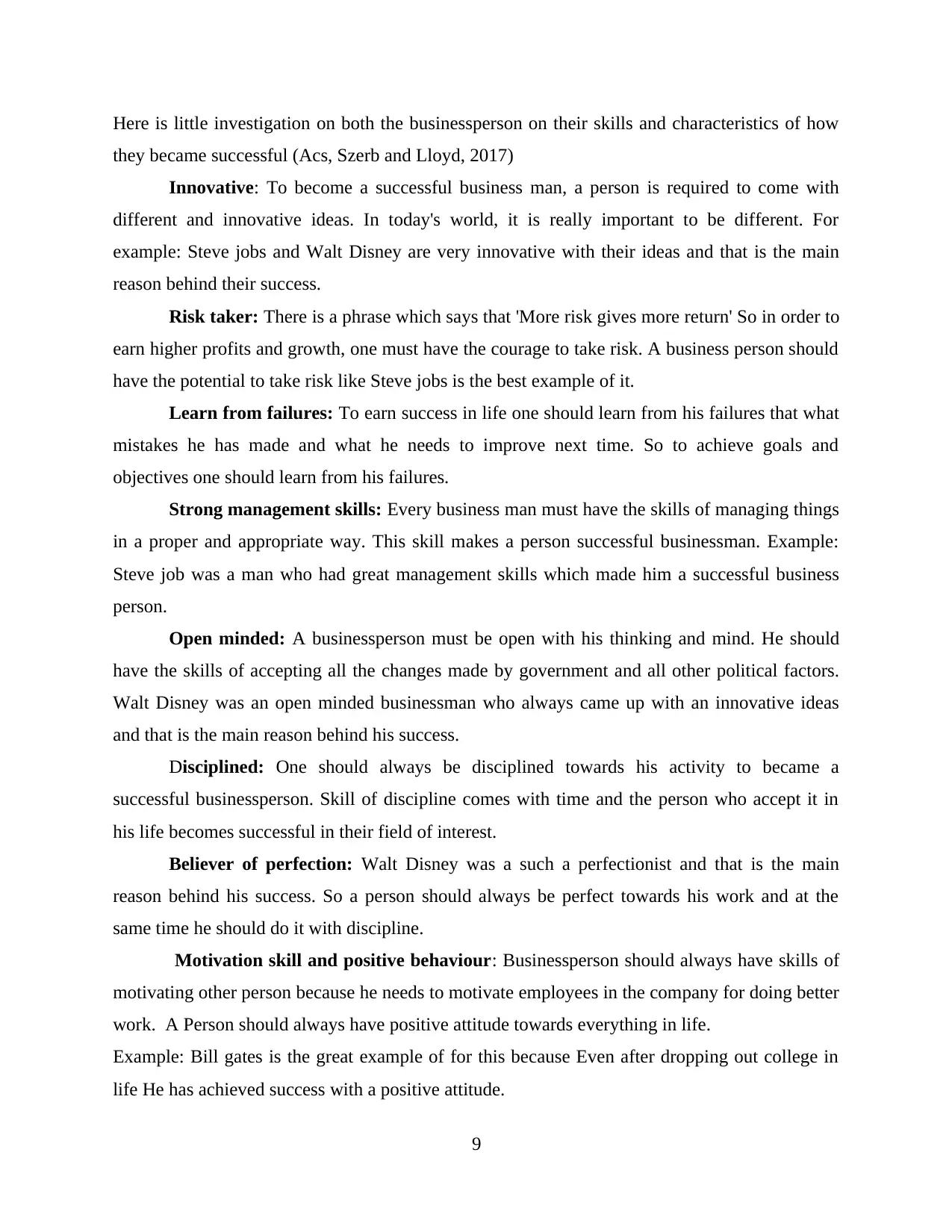
Here is little investigation on both the businessperson on their skills and characteristics of how
they became successful (Acs, Szerb and Lloyd, 2017)
Innovative: To become a successful business man, a person is required to come with
different and innovative ideas. In today's world, it is really important to be different. For
example: Steve jobs and Walt Disney are very innovative with their ideas and that is the main
reason behind their success.
Risk taker: There is a phrase which says that 'More risk gives more return' So in order to
earn higher profits and growth, one must have the courage to take risk. A business person should
have the potential to take risk like Steve jobs is the best example of it.
Learn from failures: To earn success in life one should learn from his failures that what
mistakes he has made and what he needs to improve next time. So to achieve goals and
objectives one should learn from his failures.
Strong management skills: Every business man must have the skills of managing things
in a proper and appropriate way. This skill makes a person successful businessman. Example:
Steve job was a man who had great management skills which made him a successful business
person.
Open minded: A businessperson must be open with his thinking and mind. He should
have the skills of accepting all the changes made by government and all other political factors.
Walt Disney was an open minded businessman who always came up with an innovative ideas
and that is the main reason behind his success.
Disciplined: One should always be disciplined towards his activity to became a
successful businessperson. Skill of discipline comes with time and the person who accept it in
his life becomes successful in their field of interest.
Believer of perfection: Walt Disney was a such a perfectionist and that is the main
reason behind his success. So a person should always be perfect towards his work and at the
same time he should do it with discipline.
Motivation skill and positive behaviour: Businessperson should always have skills of
motivating other person because he needs to motivate employees in the company for doing better
work. A Person should always have positive attitude towards everything in life.
Example: Bill gates is the great example of for this because Even after dropping out college in
life He has achieved success with a positive attitude.
9
they became successful (Acs, Szerb and Lloyd, 2017)
Innovative: To become a successful business man, a person is required to come with
different and innovative ideas. In today's world, it is really important to be different. For
example: Steve jobs and Walt Disney are very innovative with their ideas and that is the main
reason behind their success.
Risk taker: There is a phrase which says that 'More risk gives more return' So in order to
earn higher profits and growth, one must have the courage to take risk. A business person should
have the potential to take risk like Steve jobs is the best example of it.
Learn from failures: To earn success in life one should learn from his failures that what
mistakes he has made and what he needs to improve next time. So to achieve goals and
objectives one should learn from his failures.
Strong management skills: Every business man must have the skills of managing things
in a proper and appropriate way. This skill makes a person successful businessman. Example:
Steve job was a man who had great management skills which made him a successful business
person.
Open minded: A businessperson must be open with his thinking and mind. He should
have the skills of accepting all the changes made by government and all other political factors.
Walt Disney was an open minded businessman who always came up with an innovative ideas
and that is the main reason behind his success.
Disciplined: One should always be disciplined towards his activity to became a
successful businessperson. Skill of discipline comes with time and the person who accept it in
his life becomes successful in their field of interest.
Believer of perfection: Walt Disney was a such a perfectionist and that is the main
reason behind his success. So a person should always be perfect towards his work and at the
same time he should do it with discipline.
Motivation skill and positive behaviour: Businessperson should always have skills of
motivating other person because he needs to motivate employees in the company for doing better
work. A Person should always have positive attitude towards everything in life.
Example: Bill gates is the great example of for this because Even after dropping out college in
life He has achieved success with a positive attitude.
9
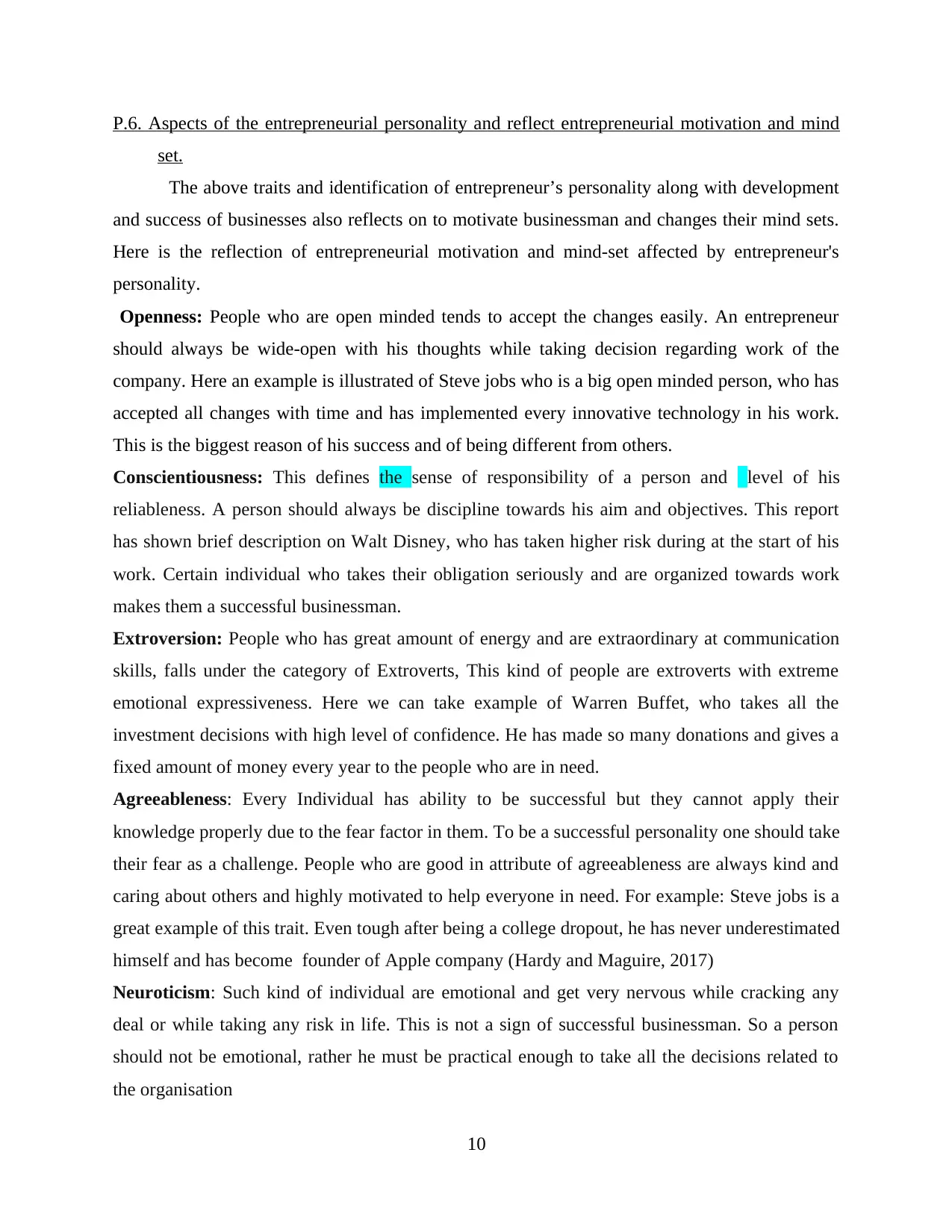
P.6. Aspects of the entrepreneurial personality and reflect entrepreneurial motivation and mind
set.
The above traits and identification of entrepreneur’s personality along with development
and success of businesses also reflects on to motivate businessman and changes their mind sets.
Here is the reflection of entrepreneurial motivation and mind-set affected by entrepreneur's
personality.
Openness: People who are open minded tends to accept the changes easily. An entrepreneur
should always be wide-open with his thoughts while taking decision regarding work of the
company. Here an example is illustrated of Steve jobs who is a big open minded person, who has
accepted all changes with time and has implemented every innovative technology in his work.
This is the biggest reason of his success and of being different from others.
Conscientiousness: This defines the sense of responsibility of a person and level of his
reliableness. A person should always be discipline towards his aim and objectives. This report
has shown brief description on Walt Disney, who has taken higher risk during at the start of his
work. Certain individual who takes their obligation seriously and are organized towards work
makes them a successful businessman.
Extroversion: People who has great amount of energy and are extraordinary at communication
skills, falls under the category of Extroverts, This kind of people are extroverts with extreme
emotional expressiveness. Here we can take example of Warren Buffet, who takes all the
investment decisions with high level of confidence. He has made so many donations and gives a
fixed amount of money every year to the people who are in need.
Agreeableness: Every Individual has ability to be successful but they cannot apply their
knowledge properly due to the fear factor in them. To be a successful personality one should take
their fear as a challenge. People who are good in attribute of agreeableness are always kind and
caring about others and highly motivated to help everyone in need. For example: Steve jobs is a
great example of this trait. Even tough after being a college dropout, he has never underestimated
himself and has become founder of Apple company (Hardy and Maguire, 2017)
Neuroticism: Such kind of individual are emotional and get very nervous while cracking any
deal or while taking any risk in life. This is not a sign of successful businessman. So a person
should not be emotional, rather he must be practical enough to take all the decisions related to
the organisation
10
set.
The above traits and identification of entrepreneur’s personality along with development
and success of businesses also reflects on to motivate businessman and changes their mind sets.
Here is the reflection of entrepreneurial motivation and mind-set affected by entrepreneur's
personality.
Openness: People who are open minded tends to accept the changes easily. An entrepreneur
should always be wide-open with his thoughts while taking decision regarding work of the
company. Here an example is illustrated of Steve jobs who is a big open minded person, who has
accepted all changes with time and has implemented every innovative technology in his work.
This is the biggest reason of his success and of being different from others.
Conscientiousness: This defines the sense of responsibility of a person and level of his
reliableness. A person should always be discipline towards his aim and objectives. This report
has shown brief description on Walt Disney, who has taken higher risk during at the start of his
work. Certain individual who takes their obligation seriously and are organized towards work
makes them a successful businessman.
Extroversion: People who has great amount of energy and are extraordinary at communication
skills, falls under the category of Extroverts, This kind of people are extroverts with extreme
emotional expressiveness. Here we can take example of Warren Buffet, who takes all the
investment decisions with high level of confidence. He has made so many donations and gives a
fixed amount of money every year to the people who are in need.
Agreeableness: Every Individual has ability to be successful but they cannot apply their
knowledge properly due to the fear factor in them. To be a successful personality one should take
their fear as a challenge. People who are good in attribute of agreeableness are always kind and
caring about others and highly motivated to help everyone in need. For example: Steve jobs is a
great example of this trait. Even tough after being a college dropout, he has never underestimated
himself and has become founder of Apple company (Hardy and Maguire, 2017)
Neuroticism: Such kind of individual are emotional and get very nervous while cracking any
deal or while taking any risk in life. This is not a sign of successful businessman. So a person
should not be emotional, rather he must be practical enough to take all the decisions related to
the organisation
10
⊘ This is a preview!⊘
Do you want full access?
Subscribe today to unlock all pages.

Trusted by 1+ million students worldwide
1 out of 16
Related Documents
Your All-in-One AI-Powered Toolkit for Academic Success.
+13062052269
info@desklib.com
Available 24*7 on WhatsApp / Email
![[object Object]](/_next/static/media/star-bottom.7253800d.svg)
Unlock your academic potential
Copyright © 2020–2026 A2Z Services. All Rights Reserved. Developed and managed by ZUCOL.





